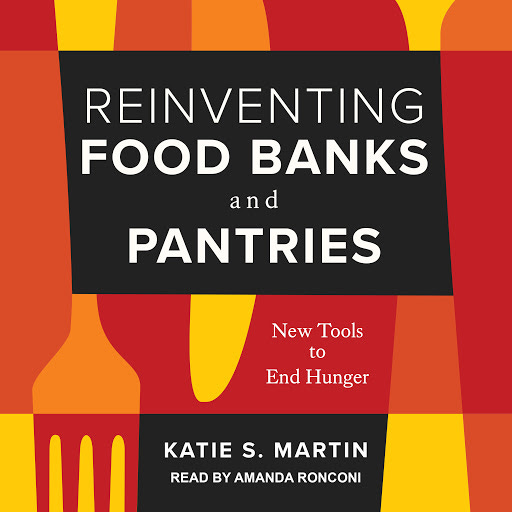Book Review of “Reinventing Food Banks and Pantries: New Tools to End Hunger,” 2021, by Katie S. Martin. Washington, DC: Island Press. Paper, 253 pages.
Some good advice for improving pantries
Improvement in programs and processes to help those in need are important to consider. Katie S. Martin gives a good summary of most of the essential elements of a good pantry and ways to get people working together toward the goal of helping others who need food and other services. Martin does not talk about a comprehensive pantry but does hint at some of the items beyond food that many people need, such as job information and help setting goals to become more self-sufficient.
Many items do not exist in most pantries around the country. Classes so people can learn about nutrition, so they can learn English, and so they can learn better ways to cook are all good. Some pantries have access to people who can teach those topics and skills, plus the room to do it, plus the schedule to allow for classes. Many do not have any of those resources—at least not right now.
It is true that fundraising and networking are very important for getting a lot of the “extras” up and running. Constant work to get those other areas covered in a pantry means work doing networking and making connections. Martin does talk about partnerships and connections—and that is a particular strength of the book.
Most of what is in the book is beneficial. Many good ideas emerge here. However, there are a few chapters I would add.
The word “homeless” is not mentioned; nor is there discussion of services for persons who are currently living in that condition. This is an interesting shortcoming of the book. Readers should know that homeless persons have a completely different set of needs from people who have things like hot water, soap, towels, and of course a place to put leftovers. Giving a homeless person a loaf of bread may seem nice…. But where does that person store it? Where does that person put the bologna or cheese to make a sandwich the next day?
Staff members who have worked the front tables before have a good knowledge of the system involved and can serve as floaters, supervisors, and trainers. Having one of these persons at the front table during each delivery session could be alright—their expertise with the system is important. There are also many other tasks they can help with—including the important oversight of the process—while the people who speak other languages move in to be the new front staff of the pantry.
I remember some bad events within a pantry. One day, a homeless person was being told to stand in two different lines. How does a person do that? Since most the patrons had a place to live, the staff members were not sure how to help—and they had different understandings of how the system worked for the homeless. Better training of the staff members was obviously needed.
In another scene, I remember a frustrated staff member was yelling that “homelessness is a choice and it’s not their job to solve the world’s problems” at an unhoused individual who was trying to get certain items or food in a certain form. Again, better training was needed. And that volunteer? should have been moved to a different part of the pantry to work on a task with less contact with patrons—or shown the door.
There are many other departments that can be added to make a pantry serve more needs, such as clothing—especially job interview clothing—shoes, and household goods. Cleaning supplies are important, as are personal care items such as shampoo, saving cream, diapers, and paper products.
Advice and counseling form another department—regarding information about social security, taxes, job applications and resume’s, plus where to get discount cards, coupons, and services such as Uber and Lyft services.
Depending on the zip code you are living in, you can get so much help in Chicago and some other cities. If you are living in a zip code with high poverty and crime, you may face more difficulties getting what you need. This is an unfortunate reality of the game.
A very wise social worker I know alerted me to the zip code reality. I had not been thinking in those terms until he mentioned how true this is, and how basic many persons trying to help people consider this opinion to be. Thinking of things in terms of different zip codes is important to better understand how different neighborhoods work in a city like Chicago… how lack of opportunity dwells in certain places—and not others… and how unfair things are divided in our world.
If things were not divided so roughly, we would not need pantries and similar organizations to help keep people from starving.
Although the book does not set forth what could be called a “comprehensive pantry” it does provide some elements of good pantries and how to work to make yours better. Much of what is here would seem to make good sense for monolingual neighborhoods where people tend to come from the same background in smaller towns.





